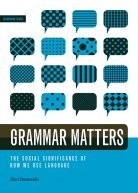Grammar Matters
Around the age of 11, I became aware of my aptitude for spelling. I only needed to see a word once, and I could spell it correctly thereafter.
My knack for spelling developed into a similar penchant for grammar, which developed into a healthy, holier-than-thou attitude regarding the rules of language.
So, I was excited to read Grammar Matters, the forthcoming book by University of Manitoba linguistics professor Jila Ghomeshi. I was even more excited that her text has a word to describe me: a prescriptive grammarian.
Generally, I like words that describe me. However, Ghomeshi argues that a prescriptive grammarian is not necessarily a good thing.
Ghomeshi’s quick, 104-page book defines descriptive grammar, which describes all aspects of a sentence (such as the pronunciation of the words and what they mean) and prescriptive grammar, which is used to judge the correctness of a sentence.
Ghomeshi argues against prescriptive grammar and the way it considers “one form of language to be inherently better than another.”
For example, I frequently disparage the effect that texting and instant messaging has on our language. However, these new spellings and pronunciations are examples of the way language has evolved for 30,000 years.
English’s imprecision also makes prescriptive grammar questionable. To put it simply: why should anybody strive for correctness in a language whose rules often defy explanation?
Ghomeshi looks beyond English to explain the language’s lack of logic. Most interestingly, she uses examples from American Sign Language, Blackfoot and Ebonics.
She then uses these different languages to explain how a society’s politics are linked (or are not linked) to its language.
The book’s highlight is Ghomeshi’s examination of why many of us subscribe to prescriptivism, tracing its rise back to when good pronunciation and grammar were “marketable assets.” She explores the way prescriptivism and its dichotomous “good” or “bad” evaluations of language are often rooted in race and socio-economic judgments.
Ultimately, Ghomeshi does defend the need for a standard language. However, she doesn’t believe that the English standard should be synonymous with “good” English.
I’m hesitant to recommend Grammar Matters – it could be used as ammunition against my frequent grammar-related admonishing.
However, I am whole-heartedly in favour of Ghomeshi’s fascinating, accessible and well-organized argument. Her book is a call for liberation from the inherent judgments of prescriptivism; such self-reflection should be encouraged.
Published in Volume 65, Number 10 of The Uniter (November 4, 2010)








